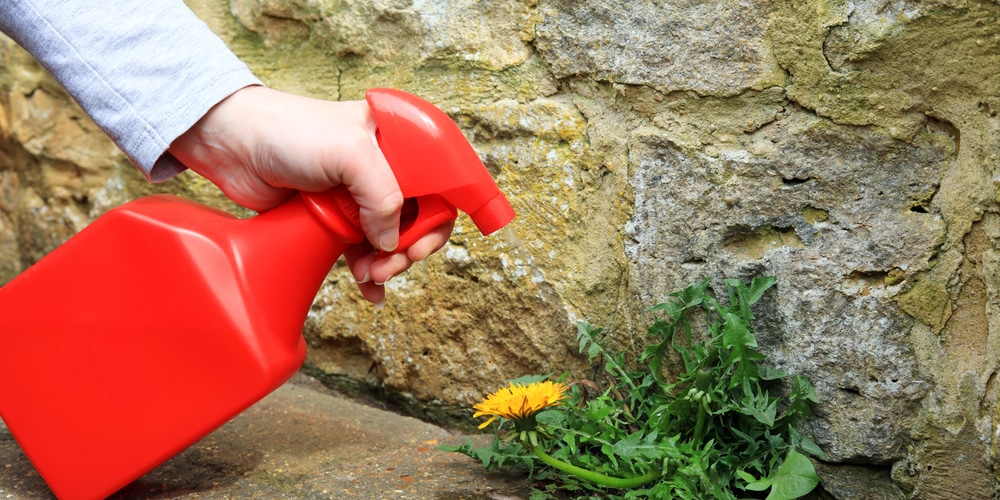Dandelions dot the springtime meadow like flecks of gold. However, these plants can wreak havoc on your lawn despite their cheerful and sunny appearance. You may be wondering what the best dandelion killer that won’t kill grass is?
As pretty as these flowers are, they belong to the weed family and can be challenging to get rid of. They have a deep taproot that makes them hard to pull up, and they can quickly spread their seeds and multiply.
The best way to kill dandelions is to target the root system. This will prevent them from growing back and ensure that your lawn stays healthy.
The common challenge most gardeners and homeowners face is finding a dandelion killer that won’t harm their grass.
What Makes a Good Dandelion Killer?

There are many factors that go into making a good dandelion killer. While choosing the right product is important, it’s crucial that we know what makes a good dandelion killer before we can select the best one.
It Should Be Selective
Dandelions are one of the hardiest weeds out there. They can withstand harsh conditions and still manage to grow and spread their seeds. So, what makes a good dandelion killer?
First and foremost, it should be selective. There are many different herbicides on the market, but not all of them will kill dandelions without harming your grass and other plants.
Must be Highly Effective
Of course, the most important thing to look for in a dandelion killer is effectiveness. The solution must be highly effective, targeting and killing every dandelion in your garden without causing any damage to your grass and other plants.
Many different products on the market claim to be the best dandelion killer. However, not all of them live up to their promises. When choosing a product, it’s essential to consider its selectivity and effectiveness.
Contains a Potent Active Ingredient
When choosing a good dandelion killer, the most important thing is to ensure that the product you’re using contains a powerful, active ingredient.
This could be anything from glyphosate to dichlobenil, and some of the most effective options are broad-spectrum herbicides that can target a wide range of unwanted plants.
Glyphosate is a popular choice, as it’s highly effective at killing dandelions and other weeds. It works by inhibiting an enzyme that’s essential for plant growth. This prevents the weed from growing and eventually kills it.
Dichlobenil is another effective option that works similarly to glyphosate. However, it’s not as widely available, and it can be more expensive.
Best Dandelion Killer That Won’t Kill Grass?
There are many different ways to kill a dandelion, but each method has its own advantages and disadvantages. For example, pulling the weed by hand is often the most effective way to get rid of it, but it can also be the most labor-intensive.
Some people also kill weeds by pouring boiling water on them, but this can leave a dead patch on your lawn.
Digging up the dandelion with a trowel or hoe can be a quicker process, but it may not always be completely successful in removing the entire plant.
Other than manually removing the weed, there are a few different ways to kill dandelions, and these are:
Herbicides
The most common method for killing dandelions is to use herbicides. Glyphosate and dichlobenil are two of the most effective active ingredients, but there are many different products on the market that contain these chemicals. It’s essential to choose a selective herbicide that won’t damage your grass or other plants.
Herbicides come in different forms, including liquids, granules, and gels. They can be applied using a watering can or hose-end sprayer. For best results, apply the herbicide to the dandelion leaves when they’re dry.
This will ensure that the chemical is absorbed by the plant and doesn’t get washed away by rain or irrigation. Remember that you go with a selective broadleaf herbicide. This means that it will kill dandelions, but not your grass.
Dung Beetles
Another option for killing dandelions is to use dung beetles. These insects are attracted to the white, milky sap found in the dandelion’s stem. Once they’ve been drawn to the plant, they’ll lay their eggs in the stem. The larvae will then eat their way through the dandelion, killing it in the process.
Dung beetles are most active during the summer months, so this is the best time to use them. They’re often found in garden centers.
Hand Digging
As mentioned earlier, hand digging is often the most effective way to remove a dandelion. It’s also the most labor-intensive method, but it’s worth it if you want to get rid of the weed quickly. It’s relatively safe to do, as long as you’re careful not to damage the roots of your grass or other plants.
To hand dig a dandelion, use a trowel or hoe to loosen the soil around the plant. Then, carefully pull the weed out of the ground, making sure to get all of the roots. You may need to dig down a few inches to make sure you’ve removed the entire plant.
Once you’ve removed the dandelion, put it in a bucket of water to prevent it from growing back. You can then dispose of it in your compost bin or trashcan.
Mulching
Mulching is another effective way to kill dandelions. It works by smothering the weed and preventing it from getting the sunlight it needs to grow. It’s also a great way to improve the appearance of your garden or lawn. Mulching is relatively easy to do. All you need is a layer of mulch, such as straw, hay, or wood chips. Apply a thick layer (about four inches) around the dandelion, being sure to cover the entire plant.
The mulch will eventually break down and add nutrients to the soil. This is beneficial for your grass and other plants. However, it can take a few months for the mulch to decompose, so you’ll need to be patient.
Best dandelion killer that wont kill grass: Final Thoughts
Dandelions are a common weed that can be found in gardens and lawns. While they’re not necessarily harmful, they can be unsightly. If you want to get rid of them, there are a few different options, including herbicides, dung beetles, hand digging, and mulching.
Among the four, herbicides are the most popular choice. They’re relatively easy to use and can be very effective.
However, ensure that you choose a selective herbicide to avoid damaging your grass or other plants.
Related Article: Do Dandelions Grow in Florida?

